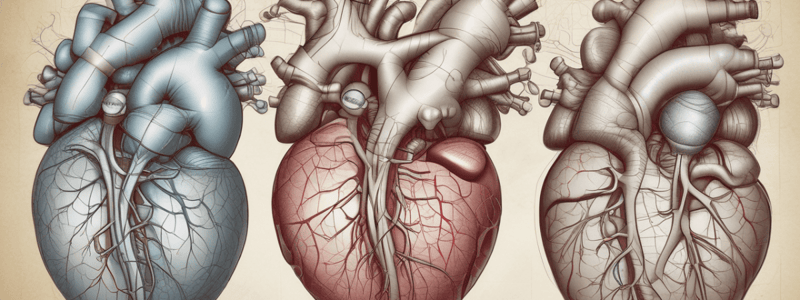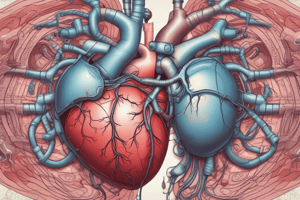Podcast
Questions and Answers
Which of the following heart valves is auscultated at the lower left sternal border, 5th intercostal space?
Which of the following heart valves is auscultated at the lower left sternal border, 5th intercostal space?
- Mitral valve
- Aortic valve
- Tricuspid valve (correct)
- Pulmonic valve
What is the most common cause of abnormal valve function?
What is the most common cause of abnormal valve function?
- Rheumatic fever (correct)
- Congenital heart defects
- Myocardial infarction
- Hypertension
What is the result of aortic valve stenosis on the left ventricle?
What is the result of aortic valve stenosis on the left ventricle?
- Left atrial dilation
- Right ventricular hypertrophy
- Increased left ventricular afterload (correct)
- Decreased left ventricular pressure
What type of murmur is heard in aortic valve stenosis?
What type of murmur is heard in aortic valve stenosis?
What is the effect of aortic valve regurgitation on the pulse pressure?
What is the effect of aortic valve regurgitation on the pulse pressure?
What is the complication of mitral valve stenosis on the oesophagus?
What is the complication of mitral valve stenosis on the oesophagus?
What is the effect of mitral valve stenosis on the right ventricle?
What is the effect of mitral valve stenosis on the right ventricle?
What is the condition resulting from shear stress in aortic valve stenosis?
What is the condition resulting from shear stress in aortic valve stenosis?
Flashcards are hidden until you start studying
Study Notes
Auscultation of Heart Valves
- Aortic valve: right eternal border, 2nd intercostal space
- Pulmonic valve: left eternal border, 2nd intercostal space
- Tricuspid valve: lower left sternal border, 5th intercostal space
- Mitral valve: apex, 5th intercostal space, mid-clavicular line
Abnormal Valve Function
- Stenosis: valve doesn't open enough, resulting in murmurs
- Regurgitation: valve doesn't close properly, resulting in murmurs
- Common causes: rheumatic fever, infective endocarditis, myocardial infarction, congenital
- Common valves affected: aortic and mitral
Aortic Valve Stenosis
- Pathophysiology:
- Reduced blood flow through valve to outflow tract
- Increased LV pressure
- LV hypertrophy and increased left ventricular afterload
- Left-sided heart failure, leading to syncope and angina
- Microangiopathic haemolytic anaemia due to shear stress
- Murmur:
- Ejection systolic murmur loudest over the aortic area
- Narrow pulse pressure - crescendo decrescendo murmur
Aortic Valve Regurgitation
- Pathophysiology:
- Blood leaks back to ventricles in diastole
- Increased stroke volume for subsequent cardiac cycles
- LV hypertrophy due to increased workload
- Murmur:
- Early diastolic murmur loudest over aortic area
- Wide, bounding pulse
- Displaced apex beat
Mitral Valve Stenosis
- Pathophysiology:
- Reduced blood flow from LA to LV
- Increased LA pressure, leading to pulmonary hypertension and RV hypertrophy
- LA dilation, leading to atrial fibrillation and thrombus formation
- LA dilation, leading to oesophagus compression
Studying That Suits You
Use AI to generate personalized quizzes and flashcards to suit your learning preferences.




